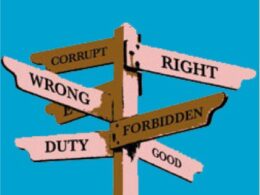The Journal of Applied Christian Leadership
By Kelvin Onongha
September 1st, 2014
This is an excerpt of the paper “ Corruption, Culture, and Conversion: The Role of the Church in Correcting a Global Concern”,
Culture and Corruption
Corruption is sometimes considered to be a cultural phenomenon related to certain variables, such as limited radius of identification and trust, limited sense of community, and an ethical code that is pliable (Harrison, 2000, p. 304).
In this context, culture may be defined as “community-specific ideas about what is true, good, beautiful, and efficient,” which are socially inherited and customary, and constitutive of different ways of life (Shweder, 2000, p. 163).
The question has also been asked, “Why are certain countries more corrupt than others?” Some persons posit that certain cultures have a greater proclivity for corrupt practices than others. Regional trends in the corruption discourse seem to endorse such a view. Gerald Caiden (2001) offers a broad picture of corruption by regions (pp. 26–30):
- Western Europe claims to have superior standards of behavior, and to have mastered corruption so that it is more an exception than a norm. There is a high degree of honesty in this region, and there’s intolerance for official misconduct.
- Australasia has also maintained a low tolerance for corruption. However, as with Western Europe, in recent years there has been a decline.
- In North America, scandals occur frequently in public life even though the constitution defines limitations on corruption, while a vigilant mass media and pressure groups help keep corruption in check.
- Southern Europe has endured scarce resources, poverty and autocracy, but also endures endemic goods and services are generally in poor conditions. In spite of public outcry, self-enrichment is still a way of life.
- Latin America and the Caribbean are not completely corrupt, for there are regions where religious outrage, democratization, and middle class professionalism have helped to check capital flight and widespread the gap between the rich and poor is wide, while the privileged elites exploit the masses that have few rights.
- Corruption in sub-Saharan Africa, which used to be blamed on colonialism (as was the case in Latin America and the Caribbean), can be attributed to dictators who treat the wealth of their countries as their private possessions.
- The Middle East has a system of corruption that permeates all aspects of society, even though the extent varies from one country to the Patron-client relationships, which are common in this context, promote favoritism, nepotism, and patronage.
- In Asia, patterns of corruption vary from one country to another. For instance, while in India efforts to contain corruption have failed miserably, in other countries, such as Singapore and Japan, the situation is a sharp contrast.
- Despite the communist background that would seem to keep down corruption, Eastern European countries are characterized by low productivity, mass apathy, and high levels of cheating. Several other vices and corrupt practices are also known to transpire in underground official exchanges. Public apathy, pilferage, and waste can be witnessed with public property.
A quantitative study by Lipset and Lenz (2000) showed the correlation between “corruption and social diversity, ethno-linguistic fractionalization, and the proportions of a country’s population adhering to different religious traditions” (p. 116).
It is apparent that Protestantism significantly affected British colonial history, infusing a lasting emphasis on procedure rather than authority which has contributed to its low levels of national corruption (Lipset & Lenz, 2000, p. 116).
Other studies indicate that strong family values between family members produce intense feelings of obligation, which in turn results in high levels of corruption; particular cases in question were southern Italy and Sicily (Lipset & Lenz, 2000, p. 116).
It is apparent that Protestantism significantly affected British colonial history, infusing a lasting emphasis on procedure rather than authority which has contributed to its low levels












